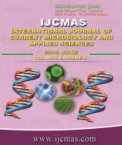


 National Academy of Agricultural Sciences (NAAS)
National Academy of Agricultural Sciences (NAAS)

|
PRINT ISSN : 2319-7692
Online ISSN : 2319-7706 Issues : 12 per year Publisher : Excellent Publishers Email : editorijcmas@gmail.com / submit@ijcmas.com Editor-in-chief: Dr.M.Prakash Index Copernicus ICV 2018: 95.39 NAAS RATING 2020: 5.38 |
Lentil (Lens culinaris Medik) is an important crop, the major states producing lentil are Madhya Pradesh, Uttar Pradesh, Bihar and Punjab. Lentil is an important component of farming systems in our country. It is one of the important and most nutritious rabi pulses. Vascular wilt causing by Fusarium oxysporum f.sp. lentis, Sclerotium rolfsii Sacc. causing collar rot and Sclerotinia sclerotiorum (Lib.) de Bary) causing stem rot, is most destructive soil borne diseases of lentil growing area worldwide. Use of chemicals continues to be major strategy to mitigate the menace of crop disease. However, because of the environmental concerns and other hazards associated with use of chemicals, use of biocontol agents is gaining importance. In the present investigation the isolation of potent bio- control and evaluated their antagonistic efficacy against Fusarium oxysporoum f.sp. lentis, Sclerotium rolfsii Sacc and Sclerotinia sclerotiorum (Lib.) de Bary in vitro. Effect of selected bio-control agent on percent inhibition of pathogen was recorded. All the isolated Trichoderma spp isolate. Pseudomonas fluorescens isolate and Bacillus subtilis were inhibit the growth of pathogen in vitro. It was observed that maximum percent inhibition recorded Trichoderma spp. isolates 7 (77.50 %) followed by (75.00%) Pseudomonas fluorescens Pf 008 and Trichoderma spp. isolate 6 (75.00%) against Fusarium oxysporoum f.sp. lentis, where, in case of Sclerotium rolfsii Sacc, maximum percent inhibition was recorded in Trichodema spp. isolate TS001 (74.22%), followed by Trichodema spp. isolate 7 (62.22%), while, Sclerotinia sclerotiorum (Lib.) de Bary), maximum percent inhibition was recorded in Pseudomonas fluorescens Pf 008 (95.50%), followed by Trichoderma spp. isolates 7 (75.55 %). This indicates above bio-control have potential and important role in biologically based strategy for management of soil borne diseases in lentil and enhance the plant growth and yield.
 |
 |
 |
 |
 |